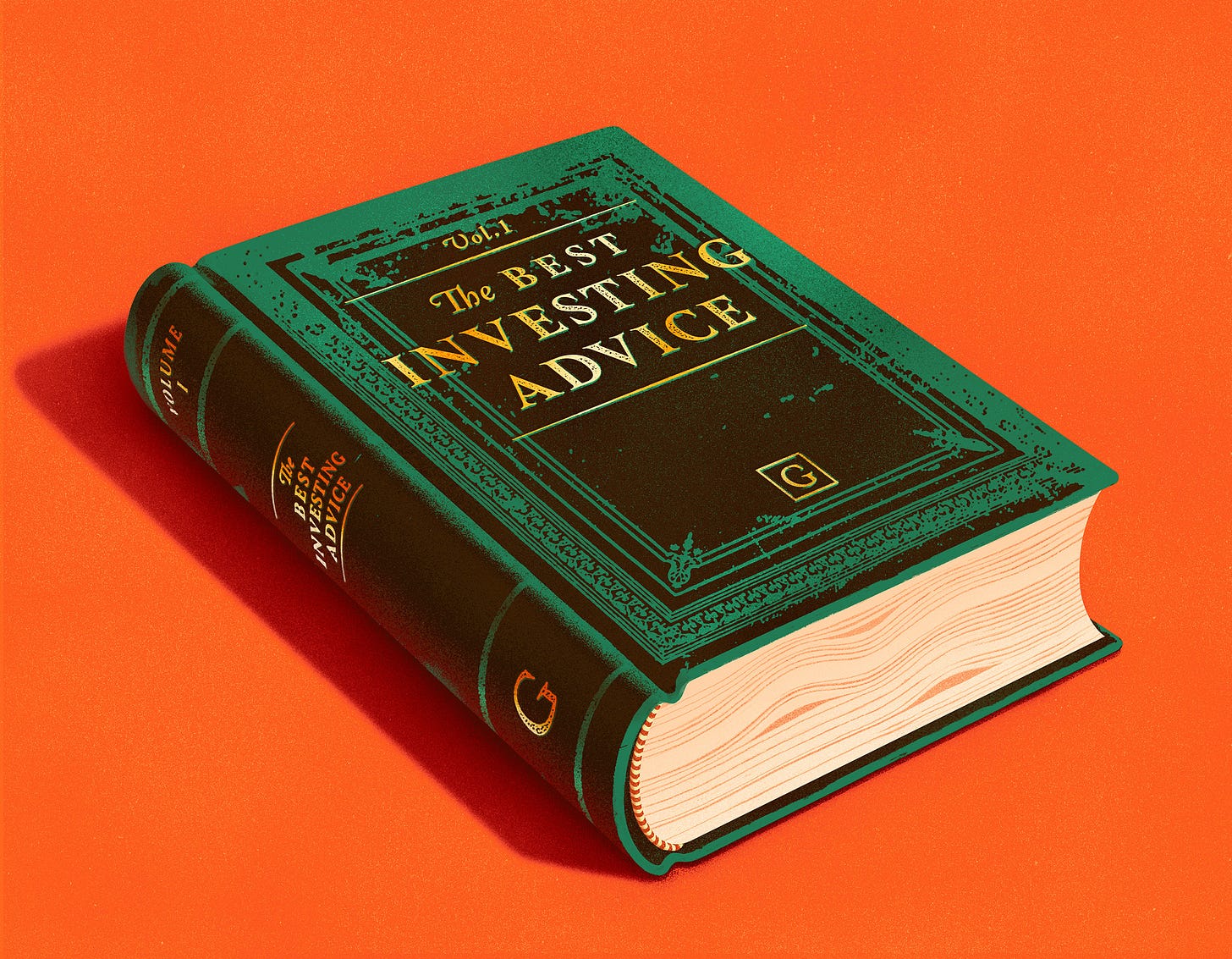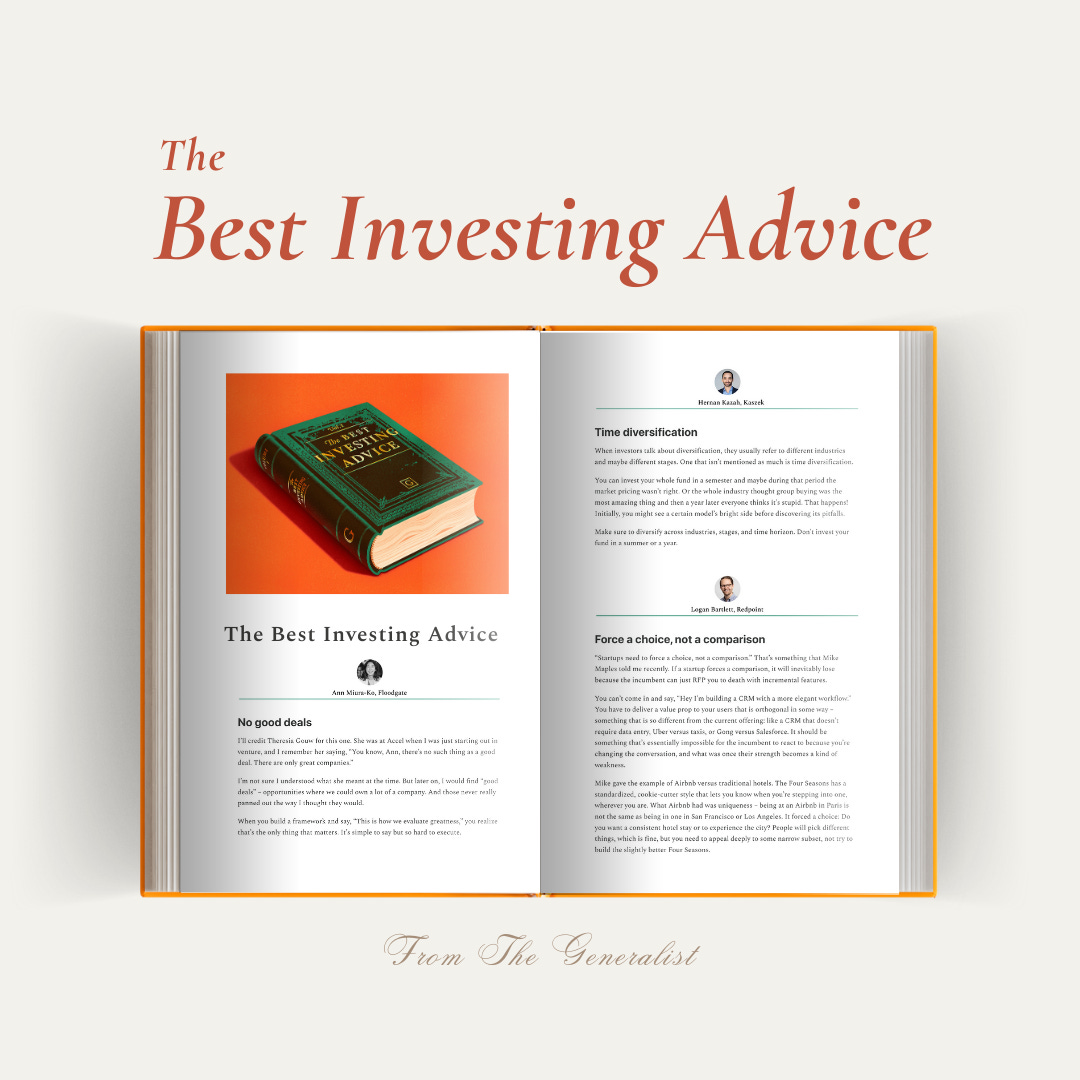🌟 Hey there! This is a subscriber-only edition of our premium newsletter designed to make you a better founder, investor, and technologist. Members get access to the strategies, tactics, and wisdom of exceptional investors and founders.
Friends,
Over the course of 2024, nearly every time I’ve interviewed an investor I’ve ended the conversation by asking for one of their favorite pieces of advice. The result is this collection: a compilation of 50 pieces of investing wisdom from 35 of the world’s best venture capital investors.
I am convinced that simply hearing them during the year improved my decision-making at key moments, and creating this guide has cemented many in my brain for good. Whether you’re a professional investor, an angel, or simply fanatical about making high-quality decisions in circumstances with imperfect information, you will find the collection invaluable.
My goal is that every piece The Generalist publishes more than repays the cost of a full year’s subscription. This is an example of a resource that I believe pays for itself many times over.
To discover the frameworks, heuristics, and hard-earned lessons of some of the most performant managers of the past couple of decades, read on.
What to expect
50 pieces of high-signal investing advice from 35 elite VCs
How a Midas List legend assesses market opportunities
When to be flexible on valuation, according to a Benchmark GP
How to make your fund 10x more successful, according to an early Canva backer
The types of deals investors regret doing
How to find your “strike zone” and what that means
The “cocktail” of traits USV believes make a great investor
The ideal founder archetype for cybersecurity
What it means to invest in “cash machines” per Frank Rotman
…And much, much more. To unlock the full compilation, learn from the best investors and discover breakout startups early, join our $22/month premium newsletter today. You’ll get instant access to our investor guides, exclusive interviews, and a private database of high-potential companies. If you work in tech or investing, it should pay for its price many times over.
Brought to you by Mercury
You’ve zeroed in on the industries and focus areas you’re looking to invest in. Now, it’s just a matter of filtering through hundreds of emails, reviewing dozens of pitch decks, and scheduling hours of calls...or is it?
Investor Connect by Mercury Raise offers a monthly opportunity to invest in top startups— minus the manual work. Simply provide your investment criteria and sit back as a fresh, curated list of startups arrives in your inbox each month.
The Best Investing Advice
No good deals
I’ll credit Theresia Gouw for this one. She was at Accel when I was just starting out in venture, and I remember her saying, “You know, Ann, there’s no such thing as a good deal. There are only great companies.”
I’m not sure I understood what she meant at the time. But later on, I would find “good deals” – opportunities where we could own a lot of a company. And those never really panned out the way I thought they would.
When you build a framework and say, “This is how we evaluate greatness,” you realize that’s the only thing that matters. It’s simple to say but so hard to execute.
Time diversification
When investors talk about diversification, they usually refer to different industries and maybe different stages. One that isn’t mentioned as much is time diversification.
You can invest your whole fund in a semester and maybe during that period the market pricing wasn’t right. Or the whole industry thought group buying was the most amazing thing and then a year later everyone thinks it’s stupid. That happens! Initially, you might see a certain model’s bright side before discovering its pitfalls.
Make sure to diversify across industries, stages, and time horizon. Don’t invest your fund in a summer or a year.
Force a choice, not a comparison
“Startups need to force a choice, not a comparison.” That’s something that Mike Maples told me recently. If a startup forces a comparison, it will inevitably lose because the incumbent can just RFP you to death with incremental features.
You can’t come in and say, “Hey I’m building a CRM with a more elegant workflow.” You have to deliver a value prop to your users that is orthogonal in some way – something that is so different from the current offering: like a CRM that doesn’t require data entry, Uber versus taxis, or Gong versus Salesforce. It should be something that’s essentially impossible for the incumbent to react to because you’re changing the conversation, and what was once their strength becomes a kind of weakness.
Mike gave the example of Airbnb versus traditional hotels. The Four Seasons has a standardized, cookie-cutter style that lets you know when you’re stepping into one, wherever you are. What Airbnb had was uniqueness – being at an Airbnb in Paris is not the same as being in one in San Francisco or Los Angeles. It forced a choice: Do you want a consistent hotel stay or to experience the city? People will pick different things, which is fine, but you need to appeal deeply to some narrow subset, not try to build the slightly better Four Seasons.
The surfer, the surfboard, and the wave
I don’t know who said this, but it’s become a common adage.
Every investment has three elements: the surfer, the surfboard, and the wave.
Of those three things, if you don’t get the wave right, nothing else matters. No matter how talented the surfer or how good the board, you’ll never have a good surf without a wave.
In an ideal world, you’re excited about all three things. You’re excited about the wave (the market and why now), the surfboard (the product), and the surfer (the founders).
I’ve found it to be a helpful framework. If you wiretapped my partner Mike and me, you’d hear us saying things like, “I’m really excited about the wave on this one but I’m unsure about the surfers, let’s get to know them better.”









